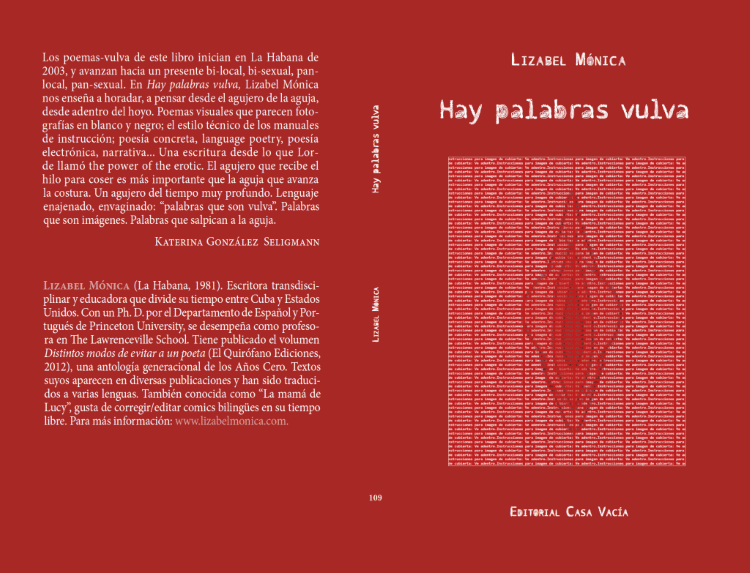“I could sing a song about it, and I want to sing it: even if I am alone in the empty house and have to sing to my own ears” – Nietzsche
A cross-disciplinary writer, curator, editor, and activist, Lizabel Mónica was born in Havana, Cuba, in 1981. She has emerged as a notable figure in the fields of literature and art. Her recent piece, Hay palabras vulva, which was released by a small Austin, Texas-based Cuban publisher, is evidence of her inventive and boundary-pushing approach to artistic expression.
Categorization is impossible for Hay palabras vulva, a unique literary work that Casa Vacía issued in 2023. The book is not only a collection; Mónica calls it an intervention. It is full of words and visual poems in Spanish, English, or both languages. It is the vulva self-portraits that this piece demands from those who are prepared to share this personal side of themselves that truly sets it apart. When these portraits are received, they are turned into visual poems, resulting in a dramatic and thought-provoking public intervention.
The vulva poems in the book take the reader on a historical and intimate trip that starts in Havana in 2003. As it is stated in the prologue by Katerina Gonzalez Selingmann The poems represent a story that crosses boundaries and time as they develop toward a pan-local, pan-sexual, bi-local, and bi-sexual present. Through her work, Lizabel Mónica challenges readers to delve deeper and consider things from a different angle. With influence from technical styles found in instruction manuals, concrete poetry, language poetry, electronic poetry, and narrative forms, this metaphorical method produces visual poems reminiscent of black and white images.
The aesthetic decision to highlight the hole rather than the needle parallels Audre Lorde’s exploration of the power of the erotic. By delving into a vocabulary that is alienated and evaginated—what she refers to as “words that are vulva”—Mónica urges readers to visit a very deep time hole. When used in this way, words transform into visually striking visuals that defy conventions in language by producing a visceral and sensual experience.

Photo Courtesy: PR Fueled
Beyond her work on Hay palabras vulva, Mónica has a long and varied career that includes positions as an educator, editor, curator, and writer. She has shown a strong dedication to academic excellence by receiving her Ph.D. from Princeton University’s Department of Spanish and Portuguese. Mónica has worked as a professor at The Lawrenceville School for five years and currently works as an instructor at The Pennington School. She spends her days fostering her students’ creativity and intellectual development.
Mónica’s engagement with cultural projects, including the coordination of DESLIZ, an international project encompassing art, writing, and critical thinking, underscores her commitment to fostering cultural exchange and pushing the boundaries of artistic expression. Her involvement in various digital magazines and her role as a feminist supporting the Fruta Bomba project in Havana showcase the intersectionality of her interests in literature, digital media, and activism.
Lizabel Mónica is renowned for her work as a poet and fiction writer in addition to her scholarly and artistic pursuits. Her book Different Ways of Avoiding a Poet, which was released in 2012 by El Quirófano Ediciones, is a generational compilation of the Zero Years and highlights the range of her abilities as a critic and artist.
To sum up, Lizabel Mónica has made a significant and varied contribution to the literary and artistic worlds. Hay palabras vulva is a powerful illustration of her capacity to combine activism and creativity, enticing readers to delve into the intricate and subtle relationships between language, art, and identity. Mónica is a really unique and significant figure in modern literature and beyond. Her voyage also symbolizes a commitment to breaking down borders and questioning old norms.
Published by: Nelly Chavez








